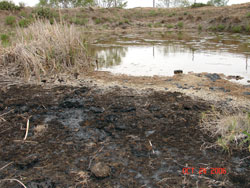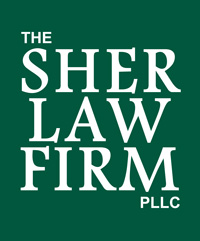Oilfield Contamination Cleanup Claims
Oil & Gas Exploration, Production and Transportation operations have made a huge impact on our everyday lives. Too often, however, these operations can also terribly impact our health, land and resources. The Sher Law firm provides expert legal assistance in oilfield contamination cleanup claims.
and Transportation operations have made a huge impact on our everyday lives. Too often, however, these operations can also terribly impact our health, land and resources. The Sher Law firm provides expert legal assistance in oilfield contamination cleanup claims.
Contamination from pipelines, flow lines, abandoned pits, storage tank, wells and other oilfield equipment can cause devastating environmental effects visible on the surface including de-vegetation and staining; as well as less visible subsurface soil and groundwater pollution.
In fact, leaks and spills, contaminated rust or scale from piping and equipment, and NORM (naturally occurring radioactive material) can continue to pollute the land for decades following the cessation of oil and gas operations. Landowners may be able to recover financial compensation for spilled oil, chemicals, salt water and other oilfield pollutants, even if it occurred many years ago.
If you or your family own land where oil and gas companies have operated wells, pipeline, pits or tanks at anytime, you may have a claim for damages and clean up or remediation.
Please call us at TOLL FREE 1.800.962.5152 to learn more. The call is free and in no way obligates you to do anything.
We look forward to hearing from you.
Oilfield Contamination Cleanup Claims: Applicable Railroad Commission of Texas Rules and Regulations
The Railroad Commission of Texas is vested with primary rule-making authority for the environmental protection of surface and groundwater in or near regulated oil and gas production activities. In many case, the acts and omissions of oil and gas operating companies violated the rules and regulations of the Railroad Commission regarding surface spills and groundwater contamination. These operators often times repeatedly fail to take responsible action to remediate known contamination, violating the law and industry standards, including but not limited to:
- Railroad Commission Statewide Rule 3.8 (16 TAC § 3.8—Water Protection), which provides for regulation of pollution control, disposal methods, pit requirements, and permitting for potential sources of pollution associated with oil and gas exploration, all designed to prevent any adverse impact on surface or subsurface waters in the State of Texas.
- Railroad Commission Statewide Rule 3.20 (16 TAC § 3.20— Notice of Release), a rule that mandates that leaks, spills or releases over 5 barrels must be reported to the RRC.
- Railroad Commission Statewide Rule 3.91 (16 TAC § 3.91—Cleanup of Soil Contaminated by a Crude Oil Spill) which sets forth the actions required to address leaks, spills and releases of crude oil to the environment.
- Railroad Commission Statewide Rule 3.98 (16 TAC § 3.98—Standards for Management of Hazardous Oil & Gas Waste), that requires that any hazardous oil and gas waste be disposed of in accordance with specific guidelines.
Compliance with all Railroad Commission regulations is required of the oil and gas production, storage and transportation operations in the State of Texas.
The Natural Resources Code Provides a Private Cause of Action
Texas Natural Resources Code sections 85.321 and 85.322 set forth the unqualified right of landowners to sue oil industry companies for all violations of applicable Railroad Commission rules and regulations:
§ 85.321. Suit For Damages
A party who owns an interest in property or production that may be damaged by another party violating the provisions of this chapter that were formerly a part of Chapter 26, Acts of the 42nd Legislature, 1st Called Session, 1931, as amended, or another law of this state prohibiting waste or a valid rule or order of the commission may sue for and recover damages and have any other relief to which he may be entitled, at law or in equity.
§ 85.322. Proceedings Not To Impair Suit For Damages:
None of the provisions of this chapter that were formerly a part of Chapter 26, Acts of the 42nd Legislature, lst Called Session, 1931, as amended, no suit by or against the commission, and no penalties imposed on or claimed against any party violating a law, rule, or order of the commission shall impair or abridge or delay a cause of action for damages or other relief that an owner of land or a producer of oil and gas, or any other party at interest, may have or assert against any party violating any rule or order of the commission or any judgment of this chapter.
TEX. NAT. RES. CODE §§85.321 AND 85.322. Unfortunately, rather than implementing reasonable, necessary and timely responsive actions, numerous oil industry companies simply ignore the threat to surface and groundwater resources caused by spills, leaks or releases of hydrocarbons and other substances on the ground from their operations.
The failure to comply with statutes and Railroad Commission regulations in causing and continuing to cause pollution to the surface, subsurface and groundwater on and underlying land may constitute negligence, negligence per se, trespass and nuisance under the laws and statutes of the State of Texas. Many times polluters may be grossly negligent, willful and/or reckless as those terms are legally defined. Accordingly, some polluters should be held accountable for exemplary damages for creating, maintaining and/or failing to clean up contamination.
If you or your family own land where oil and gas companies operated wells, pipeline, pits and tanks at anytime during the past 100 years, you may have a claim for damages and clean up or remediation.
Please call us at TOLL FREE 1.800.962.5152 to learn more. The call is free and in no way obligates you to do anything.
We look forward to hearing from you.
Based in Houston, The Sher Law Firm, PLLC, serves the needs of clients in complex environmental, oil and gas, personal injury and commercial litigation throughout Texas, including greater Houston, Dallas-Fort Worth, San Antonio, Corpus Christi, El Paso, the Rio Grande Valley, the Texas Panhandle, Midland/Odessa and Lubbock. We also handle litigation in other states through association with local counsel in California, Colorado, Illinois, New Mexico, Oklahoma and Pennsylvania.

